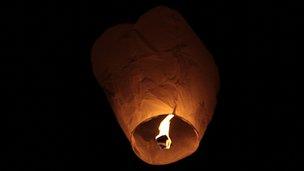Michael Eavis calls for UK ban on Chinese lanterns
- Published

The paper lanterns can float up to a mile into the air when they are lit
Glastonbury Festival boss Michael Eavis has called for a nationwide ban on Chinese lanterns.
The paper lanterns are not allowed at the festival on Worthy Farm but some revellers smuggle them in and release them during the five-day event.
Mr Eavis said: "I am surrounded by farmers and when Glastonbury Festival takes place it's sky lanterns they get angry about."
He said they were a fire risk and could kill cows if they eat the metal parts.
The lanterns have been banned in Austria, Germany and Australia, but there is no law against them in the UK.
'Metal-like needles'
A spokesperson for the Department for Business Innovation and Skills said: "From a consumer point of view they are safe as long they are used according to the instructions and they are safe for consumers to use."
But Mr Eavis said that once the lanterns fall to the ground, the metal frames partially disintegrate.
"The wire is then eaten by the cows and sheep and can actually kill them by causing bleeding or blockages in their stomachs. I have had a couple of my own cows die from eating the metal-like needles," he said.
"We're not arable farmers, but when the crops get tinder dry they will go up in no time if a lit lantern were to land on them. I would like to see them banned nationwide."
The lanterns contain a wax candle which enables them to fly for up to 20 minutes, but they can descend while the candle is still burning.
Devon and Somerset Fire Service has warned people not to use them.
Spokesman Michael Toop said: "There are particular areas of concern among farmers when lanterns are ignited near open fields full of standing dry crops, woodland, moorland, and barns.
"They are also a potential hazard for starting a fire in residential areas, especially properties with thatched roofs."
- Published26 June 2011
- Published12 July 2011
- Published28 June 2011